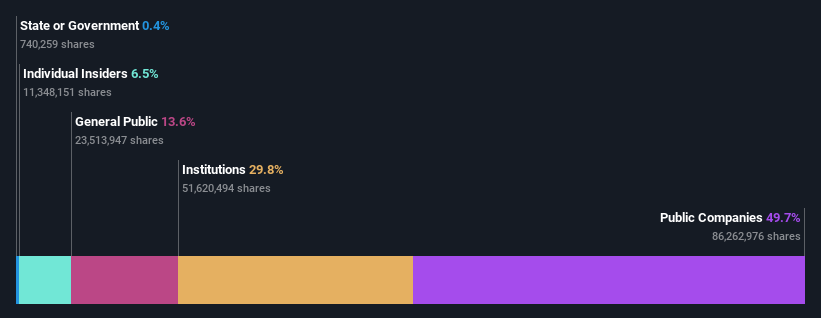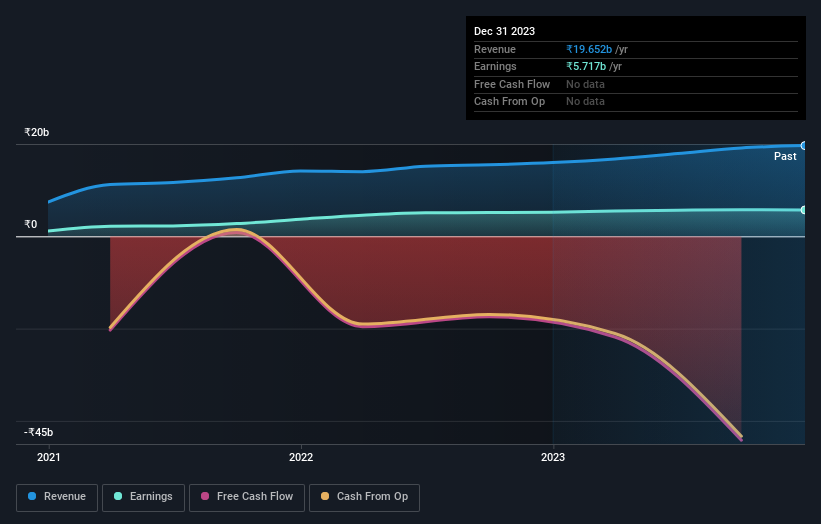Stock Analysis
CSB Bank Limited's (NSE:CSBBANK) 8.2% loss last week hit both individual investors who own 50% as well as institutions

Key Insights
- Significant control over CSB Bank by public companies implies that the general public has more power to influence management and governance-related decisions
- 59% of the business is held by the top 2 shareholders
- Institutional ownership in CSB Bank is 30%
Every investor in CSB Bank Limited (NSE:CSBBANK) should be aware of the most powerful shareholder groups. The group holding the most number of shares in the company, around 50% to be precise, is public companies. In other words, the group stands to gain the most (or lose the most) from their investment into the company.
While the holdings of public companies took a hit after last week’s 8.2% price drop, institutions with their 30% holdings also suffered.
Let's delve deeper into each type of owner of CSB Bank, beginning with the chart below.
See our latest analysis for CSB Bank

What Does The Institutional Ownership Tell Us About CSB Bank?
Institutional investors commonly compare their own returns to the returns of a commonly followed index. So they generally do consider buying larger companies that are included in the relevant benchmark index.
As you can see, institutional investors have a fair amount of stake in CSB Bank. This implies the analysts working for those institutions have looked at the stock and they like it. But just like anyone else, they could be wrong. When multiple institutions own a stock, there's always a risk that they are in a 'crowded trade'. When such a trade goes wrong, multiple parties may compete to sell stock fast. This risk is higher in a company without a history of growth. You can see CSB Bank's historic earnings and revenue below, but keep in mind there's always more to the story.

CSB Bank is not owned by hedge funds. Our data shows that Fairfax India Holdings Corporation is the largest shareholder with 50% of shares outstanding. For context, the second largest shareholder holds about 9.4% of the shares outstanding, followed by an ownership of 2.9% by the third-largest shareholder.
A more detailed study of the shareholder registry showed us that 2 of the top shareholders have a considerable amount of ownership in the company, via their 59% stake.
Researching institutional ownership is a good way to gauge and filter a stock's expected performance. The same can be achieved by studying analyst sentiments. Our information suggests that there isn't any analyst coverage of the stock, so it is probably little known.
Insider Ownership Of CSB Bank
The definition of an insider can differ slightly between different countries, but members of the board of directors always count. Company management run the business, but the CEO will answer to the board, even if he or she is a member of it.
Insider ownership is positive when it signals leadership are thinking like the true owners of the company. However, high insider ownership can also give immense power to a small group within the company. This can be negative in some circumstances.
We can report that insiders do own shares in CSB Bank Limited. As individuals, the insiders collectively own ₹3.8b worth of the ₹58b company. It is good to see some investment by insiders, but it might be worth checking if those insiders have been buying.
General Public Ownership
The general public, who are usually individual investors, hold a 14% stake in CSB Bank. This size of ownership, while considerable, may not be enough to change company policy if the decision is not in sync with other large shareholders.
Public Company Ownership
It appears to us that public companies own 50% of CSB Bank. This may be a strategic interest and the two companies may have related business interests. It could be that they have de-merged. This holding is probably worth investigating further.
Next Steps:
I find it very interesting to look at who exactly owns a company. But to truly gain insight, we need to consider other information, too.
I always like to check for a history of revenue growth. You can too, by accessing this free chart of historic revenue and earnings in this detailed graph.
Of course this may not be the best stock to buy. Therefore, you may wish to see our free collection of interesting prospects boasting favorable financials.
NB: Figures in this article are calculated using data from the last twelve months, which refer to the 12-month period ending on the last date of the month the financial statement is dated. This may not be consistent with full year annual report figures.
Valuation is complex, but we're helping make it simple.
Find out whether CSB Bank is potentially over or undervalued by checking out our comprehensive analysis, which includes fair value estimates, risks and warnings, dividends, insider transactions and financial health.
View the Free AnalysisHave feedback on this article? Concerned about the content? Get in touch with us directly. Alternatively, email editorial-team (at) simplywallst.com.
This article by Simply Wall St is general in nature. We provide commentary based on historical data and analyst forecasts only using an unbiased methodology and our articles are not intended to be financial advice. It does not constitute a recommendation to buy or sell any stock, and does not take account of your objectives, or your financial situation. We aim to bring you long-term focused analysis driven by fundamental data. Note that our analysis may not factor in the latest price-sensitive company announcements or qualitative material. Simply Wall St has no position in any stocks mentioned.
About NSEI:CSBBANK
CSB Bank
Provides banking and financial services for small and medium enterprises, retail, and NRI customers in India.
Flawless balance sheet and fair value.

